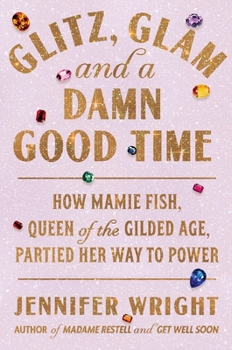Glitz, Glam, and a Damn Good Time: How Mamie Fish, Queen of the Gilded Age, Partied Her Way to Power
From the author of the critically acclaimed Madame Restell and Get Well Soon, Jennifer Wright, a provocatively written biography on Mamie Fish, also known as "The Ruler of the 400" and "The Theme Party Queen of the Gilded Age," that explores how women like Fish used parties and social gatherings to gain power and prestige
Marion Graves Anthon Fish, known by the nicknames "Mamie" and "The Fun-Maker," threw the most epic parties in American history. Whether hosting at her Upper East Side townhouse, Hudson River highlands retreat, or oceanside mansion in Newport, RI, this Gilded Age icon brought it: lavish decor; highly specific themes; A-list invitees; booze; pranks; music; surprises; large animal guest stars. If you were a member of New York high society in the Peak Age of Innocence Era, you simply had to be on Mamie Fish's guest list. There was no exile like exclusion from her parties--and no honor more exciting (or terrifying) than attending one hosted by a woman who might greet you by saying, "make yourself at home. No one wishes you were there more than I do."
At one party, Mamie required her very rich and dignified guests to dress up as dolls and speak exclusively in baby talk. Others featured fairy tale dress codes, hay rides and pitchforks, elephants who rumbled across the ballroom while guests fed them peanuts, and dogs in diamond necklaces who dined on foie gras at the table as honored guests. Mamie Fish understood that people didn't just need the formality of prior generations -- they needed wit and whimsy. They needed fun. Make no mistake, however: Mamie Fish's story is about so much more than partying. In GLITZ, GLAM, AND A DAMN GOOD TIME readers will learn all about how Fish and her friends shaped the line of history, exerting their influence on business, politics, family relationships, and social change through elaborate social gatherings. In a time when women couldn't even own property, let alone run for office, if women wanted any of the things men got outside the home--glory, money, attention, social networking, leadership roles--they had to do it by throwing a decadent soiree or chairing a cotillion. For a hostess like her, the Gilded Age presented unprecedented opportunity: a proliferation in manufacturing, which made all kinds of glittering decor available on short notice for the first time; a wild accrual of wealth at the top of high society, which gave hosts and guests alike the means to go BIG on revelry; and most important, a country rapidly shifting away from the communitarian ideals on which it was founded, for better and for worse. A brilliant strategist and kingmaker in her own right, Fish knew the power of a good party better than just about any woman who has ever lived. To ensure people would hear and remember what she had to say, Mamie Fish lived her whole life at Volume 10, becoming famous not by playing the part of a saintly helpmeet, but by letting her demanding, bitchy, hilarious, dramatic freak flag fly. And it's time to let modern readers in on the fun, the fabulousness, and the absolute ferocity that is Ms. Stuyvesant Fish--and her inimitable legacy.




